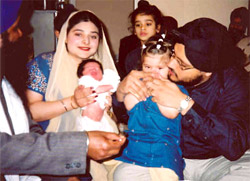Namkaran is a ceremony which is attached great importance. According to the tradition the name should be of two or four syllables. It should begin with a consonant, with a semi-vowel in it and ending with a long vowel at the end. It is believed that one who is wants to add sanctity to the name should contain four syllables. This ceremony is performed on the 12th day after child"s birth. However it varies from region to region in India. The birth of a child is always considered auspicious and every child has got a different identity and hence, it is required to provide a name to the child. The naming ceremony of the child marks the beginning of the journey of his life. The Namkaranceremony means just that and it is the first real ceremony held for the newborn child by the Hindus. "Nama" literally means name and "Karana" means to make, to effect.

Names which consist of even number of syllables are prescribed for the boys. For the girls the name should not have even number of syllables. The name should be ending with aa or ee. A girl"s name should contain three syllables. The name must be easy to pronounce, pleasing to hear, clear meaning, auspicious and ideally must end in a long vowel. The syllables in the name are based on numerology. Gifts are offered to the child. This ceremony is either held at home or in a temple. Prayers are offered to Lord Agni, elements and spirits of the forefathers and are asked to bless the new born child. In some cases if the horoscope has been written that is also placed in front of the deity. The baby is placed in the father`s lap to be blessed and then the chosen name is whispered to the child`s right ear, by using a betel leaf. Thereafter he is blessed by the people who have come for the ceremony and put some honey or sugar to the lips of the child.
According to the Grihya sutras, there are certain requisites to selecting a name for the baby. This is the name that the child is will be called. It depends on the culture, religion and education of the family, and should be auspicious.
According to the Rig Veda, a child of either gender should be given four names
•Nakshatra Name: This is given according to the constellation, or Nakshatra, the child is born under. Each constellation has a name, and several letters of the Sanskrit alphabet are also assigned to it. The Nakshatra name could therefore be the name of the constellation itself, or begin with any of the letters assigned to that constellation.
•Name of the Deity of the Month: Each month of the Hindu calendar is associated with a particular deity, which usually has several names. The child"s second name is one of the names of the deity of the month in which it is born.
•Name of the Family Deity: Every Namkaran family has one deity who has been worshipped for generations. The name of this deity is given to protect the child from evil.
•The Popular Name: This is the name that the child is known by. It depends on the culture and education of the family, and should be auspicious. According to the Grihyasutras, there are five requisites to naming a child: the name should be easy to pronounce and sound pleasant; it should contain a specified number of syllables and vowels; it should indicate the sex of the child; it should signify fame, wealth, or power; and it should be suggestive of the caste of the family.
However, this system is rarely followed these days. The reason for the naming ceremony to be after the 10th day, is specifically since, the first ten days of the post-natal period are considered "impure" time for the mother and child. Thus, on the day of the ceremony the mother and child are given a ritual bath and the house is cleaned and purified. After this, the mother swathes the baby in a piece of new cloth, applies kajal to its eyes and makes a little beauty mark on the cheek. Then, at the auspicious time, the newborn is placed in the cradle decorated with colorful flowers and ribbons. All the women gather around the cradle and sing the traditional naming ceremony songs rhyming with the newborn"s name.



















